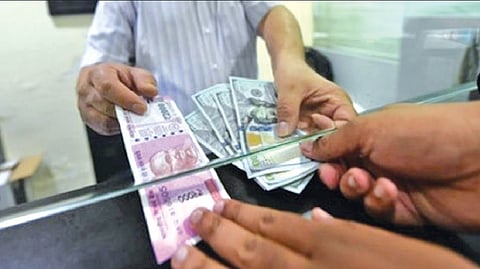

NEW DELHI: The Indian rupee nearing 80 to a US dollar will make imports of items from crude oil to electronic goods, overseas education and foreign travel costlier while raising fears that the inflation situation could worsen.
The primary and immediate impact of a depreciating rupee is on the importers who will have to shell out more for the same quantity and price. However, it is a boon for the exporters as they receive more rupees in exchange for dollars. The rupee depreciation has wiped away some of the gains that would have accrued to India from international oil and fuel prices dropping to preUkraine war levels. India is 85 per cent dependent on foreign oil to meet its needs for fuels, such as petrol, diesel and jet fuel.
The rupee, which on Thursday closed at an all-time low of Rs 79.99 to a US dollar, appreciated 7 paise to 79.92 in early trade on Friday.
The basket of Indian imports includes crude oil, coal, plastic material, chemicals, electronic goods, vegetable oil, fertiliser, machinery, gold, pearls, precious and semi-precious stones, and iron and steel.
Here is how a depreciating rupee is likely to impact spending:
Imports: Importers need to buy US dollars to pay for imported items.
With the dip in the rupee, importing items will get more expensive. Not just oil but electronic items, such as mobile phones, some cars and appliances, are likely to get expensive.
Foreign education: The rupee losing value against the US dollar would mean foreign education just became more expensive. Not just having to shell out more rupees for every dollar that the foreign institutions charge as fees, education loans too have become costlier following the interest rate hikes by the RBI.
Foreign travel: With the COVID-19 cases declining, there has been revenge travel for work and leisure. But, these have now just become more expensive.
Remittances: However, non-resident Indians (NRIs) who send money back home will end up sending more in the rupee value.
As per the latest data, the country’s imports expanded by 57.55 per cent to $ 66.31 billion in June compared to the year-ago month.
Forex reserves fall $8.062 bn to $580.252 bn: RBI data
The country’s foreign exchange reserves declined by a massive $8.062 billion to $580.252 billion in the week ended July 8, according to RBI data. In the previous week ended July 1, the reserves had dropped by $5.008 billion to $588.314 billion. During the reporting week ended July 8, the decrease in the reserves was on account of a fall in the Foreign Currency Assets (FCA), a major component of the overall reserves, and in the gold reserves, RBI said. FCA was down by $ 6.656 billion to $518.089 billion in the reporting week, according to the Reserve Bank of India’s Weekly Statistical Supplement released on Friday. Expressed in dollar terms, FCA includes the effect of appreciation or depreciation of non-US units like the euro, pound and yen held in the foreign exchange reserves. Gold reserves fell by $1.236 billion to $39.186 billion. In the reporting week ended July 8, the Special Drawing Rights (SDRs) with the International Monetary Fund (IMF) dropped by $122 million to $18.012 billion. The country’s reserve position with IMF decreased by $49 million to $4.966 billion in the reporting week, the data showed.
Visit news.dtnext.in to explore our interactive epaper!
Download the DT Next app for more exciting features!
Click here for iOS
Click here for Android